Introduction to Business: Google's Culture and Performance Analysis
VerifiedAdded on 2023/04/10
|10
|2107
|472
Report
AI Summary
This report explores the organizational culture of Google and its impact on the company's performance. It discusses Google's unique approach to human resources, focusing on data-driven decisions to improve employee satisfaction and work efficiency. The report highlights various initiatives, such as optimizing lunch lines, welcoming new employees, and designing collaborative workspaces, all aimed at fostering innovation and creativity. It also examines the role of effective managers in supporting employees and promoting a culture of continuous improvement. Google's commitment to employee well-being, flexibility, and trust is identified as a key driver of its success in the competitive online advertising and information technology industry. The report concludes that a strong organizational culture is essential for building an efficient and high-performing organization.
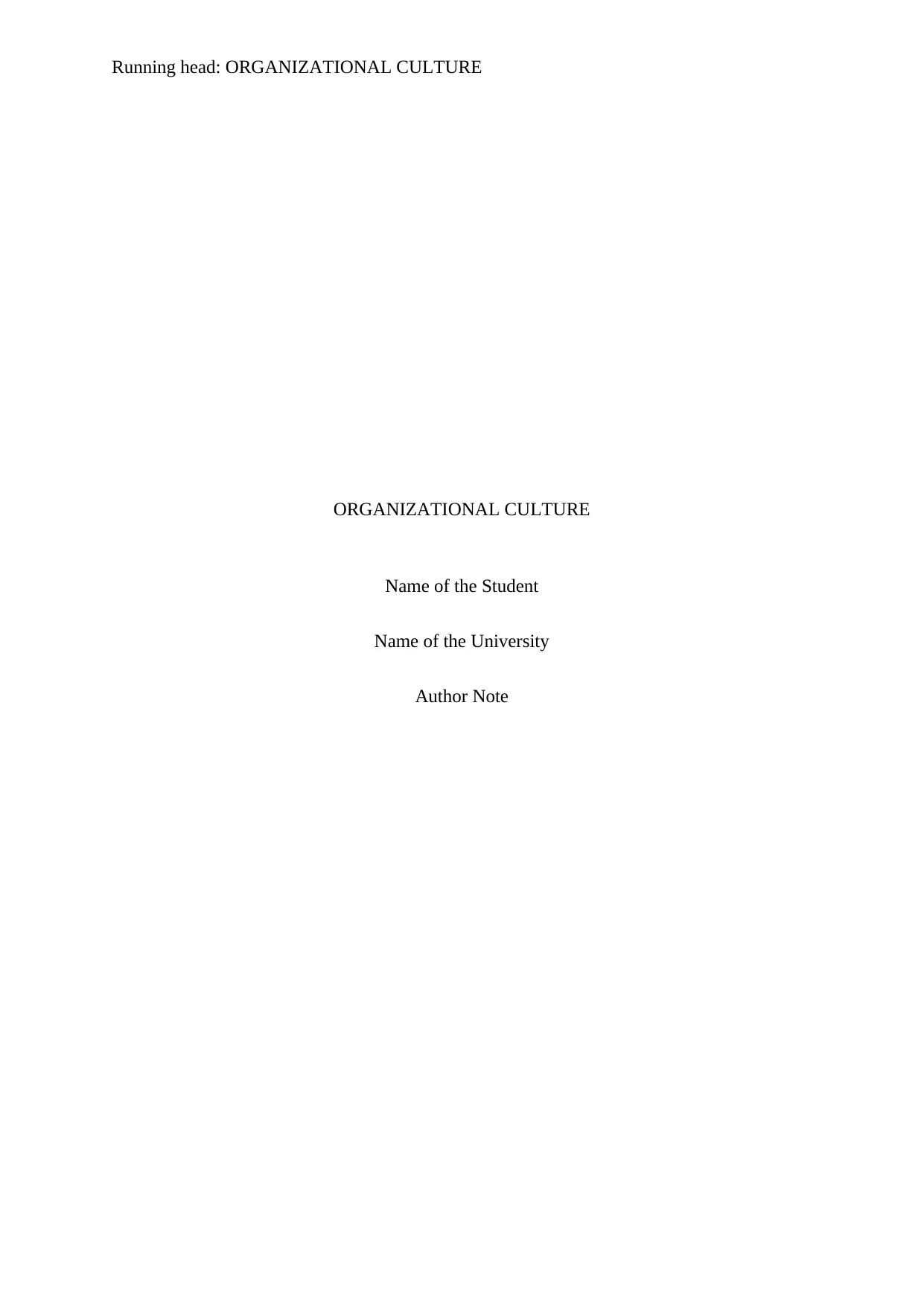
Running head: ORGANIZATIONAL CULTURE
ORGANIZATIONAL CULTURE
Name of the Student
Name of the University
Author Note
ORGANIZATIONAL CULTURE
Name of the Student
Name of the University
Author Note
Paraphrase This Document
Need a fresh take? Get an instant paraphrase of this document with our AI Paraphraser
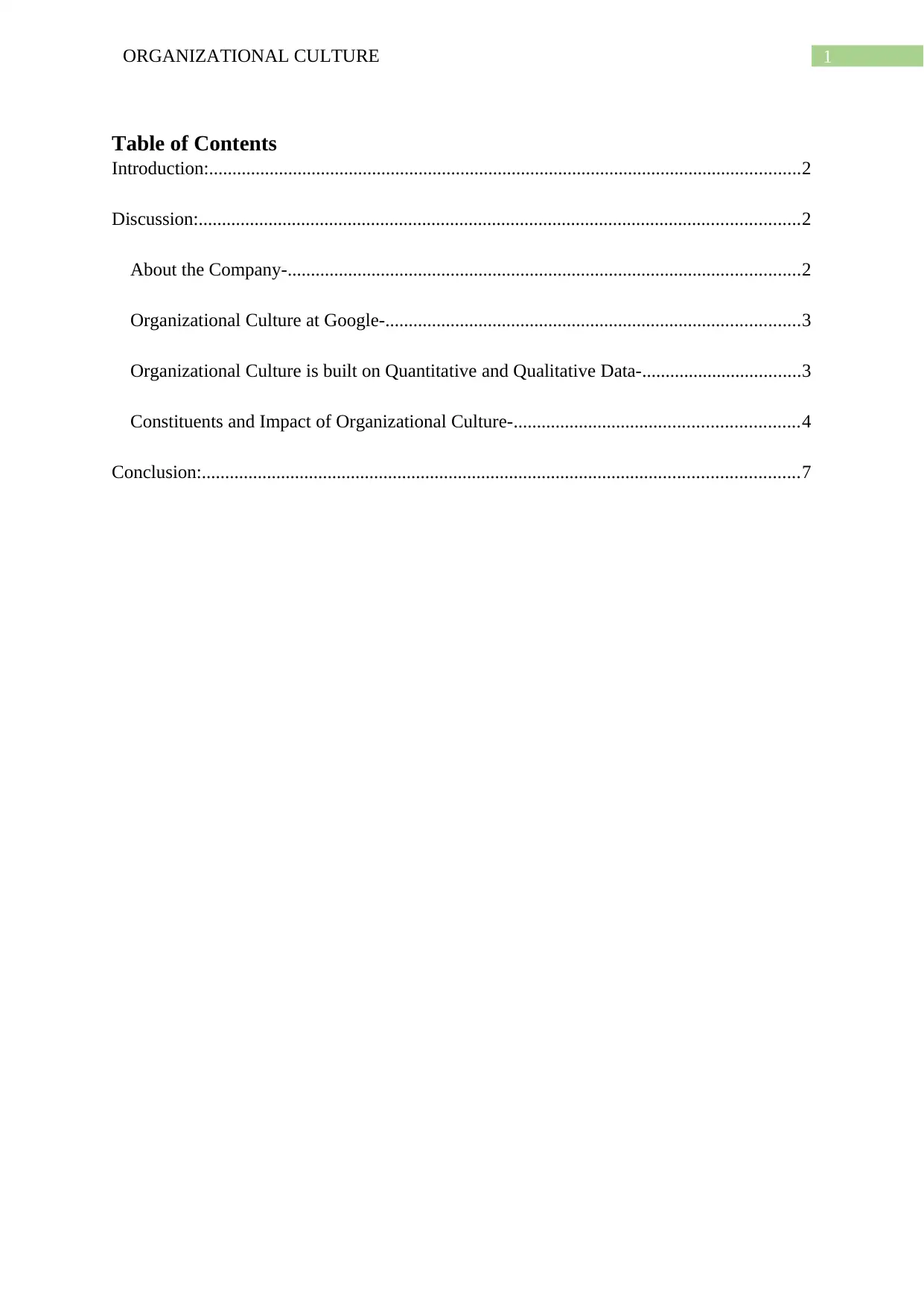
1ORGANIZATIONAL CULTURE
Table of Contents
Introduction:...............................................................................................................................2
Discussion:.................................................................................................................................2
About the Company-..............................................................................................................2
Organizational Culture at Google-.........................................................................................3
Organizational Culture is built on Quantitative and Qualitative Data-..................................3
Constituents and Impact of Organizational Culture-.............................................................4
Conclusion:................................................................................................................................7
Table of Contents
Introduction:...............................................................................................................................2
Discussion:.................................................................................................................................2
About the Company-..............................................................................................................2
Organizational Culture at Google-.........................................................................................3
Organizational Culture is built on Quantitative and Qualitative Data-..................................3
Constituents and Impact of Organizational Culture-.............................................................4
Conclusion:................................................................................................................................7
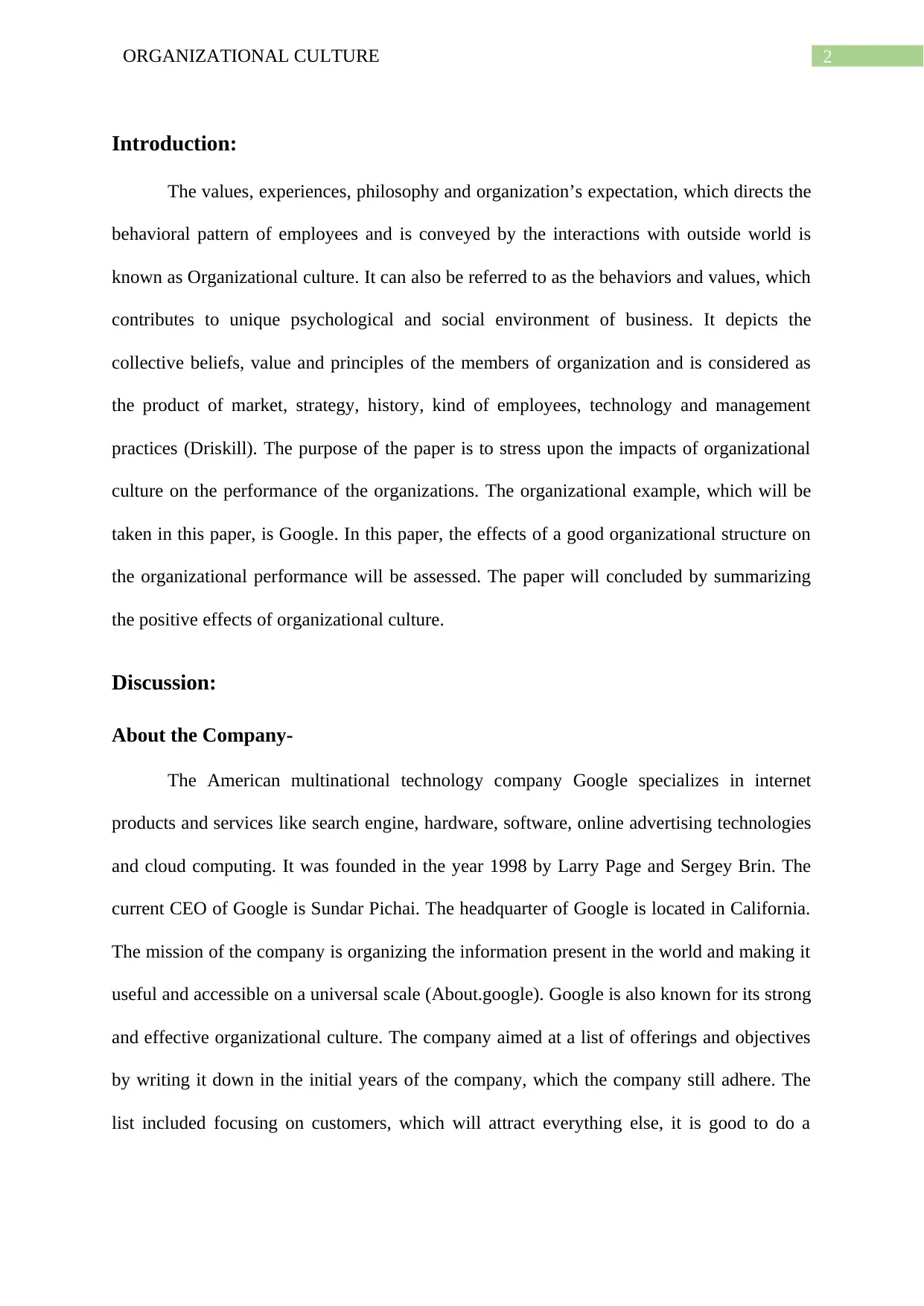
2ORGANIZATIONAL CULTURE
Introduction:
The values, experiences, philosophy and organization’s expectation, which directs the
behavioral pattern of employees and is conveyed by the interactions with outside world is
known as Organizational culture. It can also be referred to as the behaviors and values, which
contributes to unique psychological and social environment of business. It depicts the
collective beliefs, value and principles of the members of organization and is considered as
the product of market, strategy, history, kind of employees, technology and management
practices (Driskill). The purpose of the paper is to stress upon the impacts of organizational
culture on the performance of the organizations. The organizational example, which will be
taken in this paper, is Google. In this paper, the effects of a good organizational structure on
the organizational performance will be assessed. The paper will concluded by summarizing
the positive effects of organizational culture.
Discussion:
About the Company-
The American multinational technology company Google specializes in internet
products and services like search engine, hardware, software, online advertising technologies
and cloud computing. It was founded in the year 1998 by Larry Page and Sergey Brin. The
current CEO of Google is Sundar Pichai. The headquarter of Google is located in California.
The mission of the company is organizing the information present in the world and making it
useful and accessible on a universal scale (About.google). Google is also known for its strong
and effective organizational culture. The company aimed at a list of offerings and objectives
by writing it down in the initial years of the company, which the company still adhere. The
list included focusing on customers, which will attract everything else, it is good to do a
Introduction:
The values, experiences, philosophy and organization’s expectation, which directs the
behavioral pattern of employees and is conveyed by the interactions with outside world is
known as Organizational culture. It can also be referred to as the behaviors and values, which
contributes to unique psychological and social environment of business. It depicts the
collective beliefs, value and principles of the members of organization and is considered as
the product of market, strategy, history, kind of employees, technology and management
practices (Driskill). The purpose of the paper is to stress upon the impacts of organizational
culture on the performance of the organizations. The organizational example, which will be
taken in this paper, is Google. In this paper, the effects of a good organizational structure on
the organizational performance will be assessed. The paper will concluded by summarizing
the positive effects of organizational culture.
Discussion:
About the Company-
The American multinational technology company Google specializes in internet
products and services like search engine, hardware, software, online advertising technologies
and cloud computing. It was founded in the year 1998 by Larry Page and Sergey Brin. The
current CEO of Google is Sundar Pichai. The headquarter of Google is located in California.
The mission of the company is organizing the information present in the world and making it
useful and accessible on a universal scale (About.google). Google is also known for its strong
and effective organizational culture. The company aimed at a list of offerings and objectives
by writing it down in the initial years of the company, which the company still adhere. The
list included focusing on customers, which will attract everything else, it is good to do a
⊘ This is a preview!⊘
Do you want full access?
Subscribe today to unlock all pages.

Trusted by 1+ million students worldwide
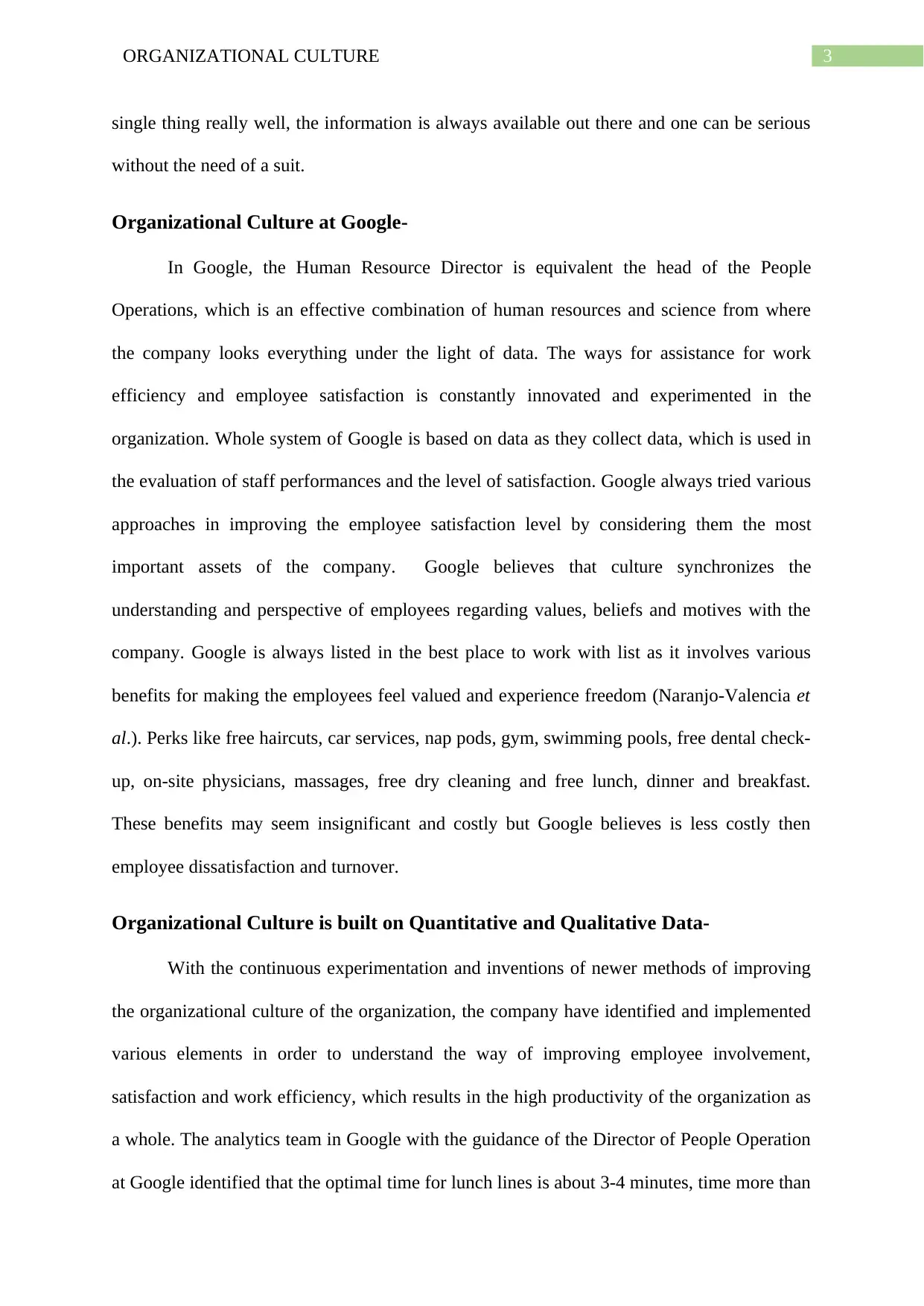
3ORGANIZATIONAL CULTURE
single thing really well, the information is always available out there and one can be serious
without the need of a suit.
Organizational Culture at Google-
In Google, the Human Resource Director is equivalent the head of the People
Operations, which is an effective combination of human resources and science from where
the company looks everything under the light of data. The ways for assistance for work
efficiency and employee satisfaction is constantly innovated and experimented in the
organization. Whole system of Google is based on data as they collect data, which is used in
the evaluation of staff performances and the level of satisfaction. Google always tried various
approaches in improving the employee satisfaction level by considering them the most
important assets of the company. Google believes that culture synchronizes the
understanding and perspective of employees regarding values, beliefs and motives with the
company. Google is always listed in the best place to work with list as it involves various
benefits for making the employees feel valued and experience freedom (Naranjo-Valencia et
al.). Perks like free haircuts, car services, nap pods, gym, swimming pools, free dental check-
up, on-site physicians, massages, free dry cleaning and free lunch, dinner and breakfast.
These benefits may seem insignificant and costly but Google believes is less costly then
employee dissatisfaction and turnover.
Organizational Culture is built on Quantitative and Qualitative Data-
With the continuous experimentation and inventions of newer methods of improving
the organizational culture of the organization, the company have identified and implemented
various elements in order to understand the way of improving employee involvement,
satisfaction and work efficiency, which results in the high productivity of the organization as
a whole. The analytics team in Google with the guidance of the Director of People Operation
at Google identified that the optimal time for lunch lines is about 3-4 minutes, time more than
single thing really well, the information is always available out there and one can be serious
without the need of a suit.
Organizational Culture at Google-
In Google, the Human Resource Director is equivalent the head of the People
Operations, which is an effective combination of human resources and science from where
the company looks everything under the light of data. The ways for assistance for work
efficiency and employee satisfaction is constantly innovated and experimented in the
organization. Whole system of Google is based on data as they collect data, which is used in
the evaluation of staff performances and the level of satisfaction. Google always tried various
approaches in improving the employee satisfaction level by considering them the most
important assets of the company. Google believes that culture synchronizes the
understanding and perspective of employees regarding values, beliefs and motives with the
company. Google is always listed in the best place to work with list as it involves various
benefits for making the employees feel valued and experience freedom (Naranjo-Valencia et
al.). Perks like free haircuts, car services, nap pods, gym, swimming pools, free dental check-
up, on-site physicians, massages, free dry cleaning and free lunch, dinner and breakfast.
These benefits may seem insignificant and costly but Google believes is less costly then
employee dissatisfaction and turnover.
Organizational Culture is built on Quantitative and Qualitative Data-
With the continuous experimentation and inventions of newer methods of improving
the organizational culture of the organization, the company have identified and implemented
various elements in order to understand the way of improving employee involvement,
satisfaction and work efficiency, which results in the high productivity of the organization as
a whole. The analytics team in Google with the guidance of the Director of People Operation
at Google identified that the optimal time for lunch lines is about 3-4 minutes, time more than
Paraphrase This Document
Need a fresh take? Get an instant paraphrase of this document with our AI Paraphraser
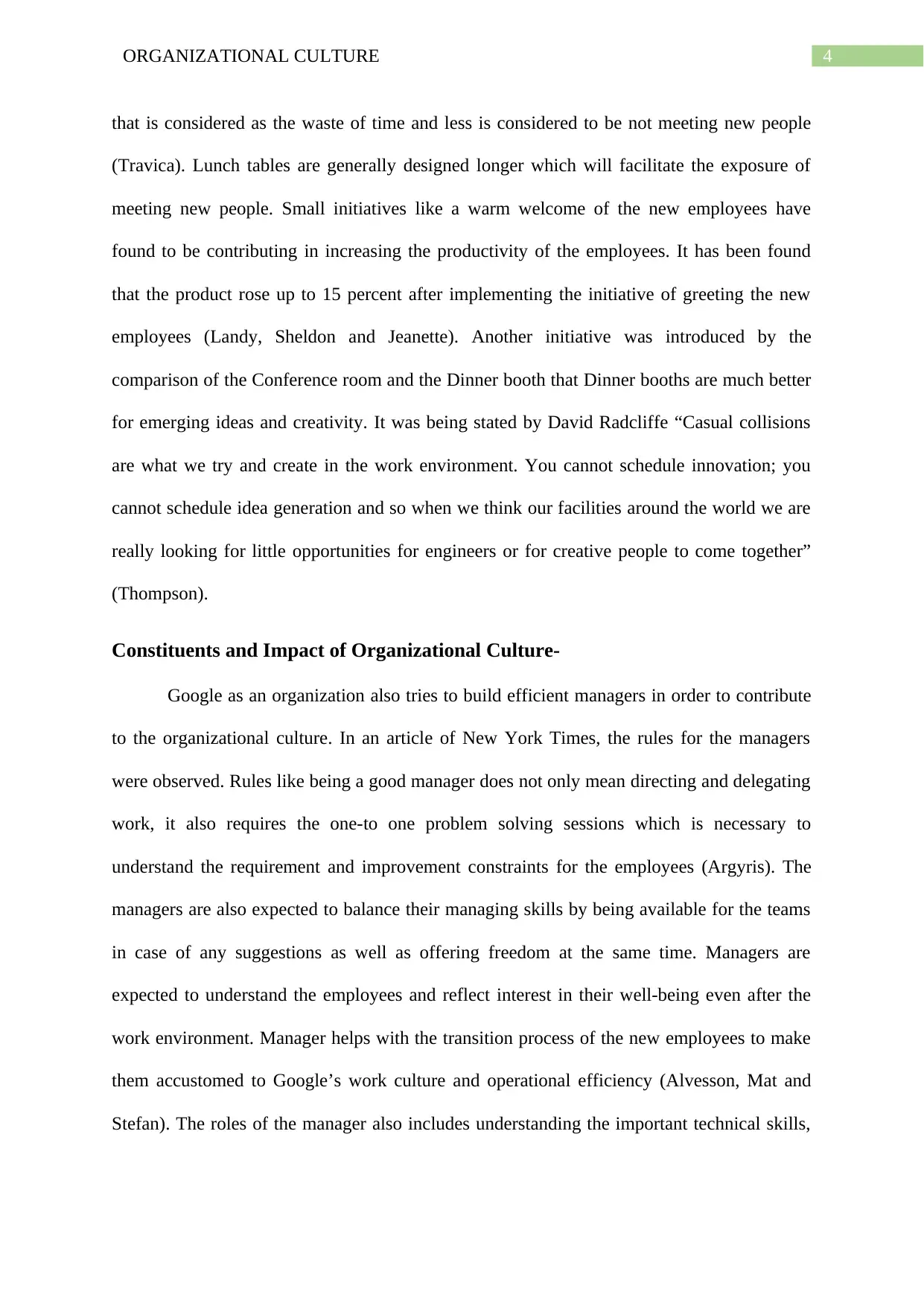
4ORGANIZATIONAL CULTURE
that is considered as the waste of time and less is considered to be not meeting new people
(Travica). Lunch tables are generally designed longer which will facilitate the exposure of
meeting new people. Small initiatives like a warm welcome of the new employees have
found to be contributing in increasing the productivity of the employees. It has been found
that the product rose up to 15 percent after implementing the initiative of greeting the new
employees (Landy, Sheldon and Jeanette). Another initiative was introduced by the
comparison of the Conference room and the Dinner booth that Dinner booths are much better
for emerging ideas and creativity. It was being stated by David Radcliffe “Casual collisions
are what we try and create in the work environment. You cannot schedule innovation; you
cannot schedule idea generation and so when we think our facilities around the world we are
really looking for little opportunities for engineers or for creative people to come together”
(Thompson).
Constituents and Impact of Organizational Culture-
Google as an organization also tries to build efficient managers in order to contribute
to the organizational culture. In an article of New York Times, the rules for the managers
were observed. Rules like being a good manager does not only mean directing and delegating
work, it also requires the one-to one problem solving sessions which is necessary to
understand the requirement and improvement constraints for the employees (Argyris). The
managers are also expected to balance their managing skills by being available for the teams
in case of any suggestions as well as offering freedom at the same time. Managers are
expected to understand the employees and reflect interest in their well-being even after the
work environment. Manager helps with the transition process of the new employees to make
them accustomed to Google’s work culture and operational efficiency (Alvesson, Mat and
Stefan). The roles of the manager also includes understanding the important technical skills,
that is considered as the waste of time and less is considered to be not meeting new people
(Travica). Lunch tables are generally designed longer which will facilitate the exposure of
meeting new people. Small initiatives like a warm welcome of the new employees have
found to be contributing in increasing the productivity of the employees. It has been found
that the product rose up to 15 percent after implementing the initiative of greeting the new
employees (Landy, Sheldon and Jeanette). Another initiative was introduced by the
comparison of the Conference room and the Dinner booth that Dinner booths are much better
for emerging ideas and creativity. It was being stated by David Radcliffe “Casual collisions
are what we try and create in the work environment. You cannot schedule innovation; you
cannot schedule idea generation and so when we think our facilities around the world we are
really looking for little opportunities for engineers or for creative people to come together”
(Thompson).
Constituents and Impact of Organizational Culture-
Google as an organization also tries to build efficient managers in order to contribute
to the organizational culture. In an article of New York Times, the rules for the managers
were observed. Rules like being a good manager does not only mean directing and delegating
work, it also requires the one-to one problem solving sessions which is necessary to
understand the requirement and improvement constraints for the employees (Argyris). The
managers are also expected to balance their managing skills by being available for the teams
in case of any suggestions as well as offering freedom at the same time. Managers are
expected to understand the employees and reflect interest in their well-being even after the
work environment. Manager helps with the transition process of the new employees to make
them accustomed to Google’s work culture and operational efficiency (Alvesson, Mat and
Stefan). The roles of the manager also includes understanding the important technical skills,
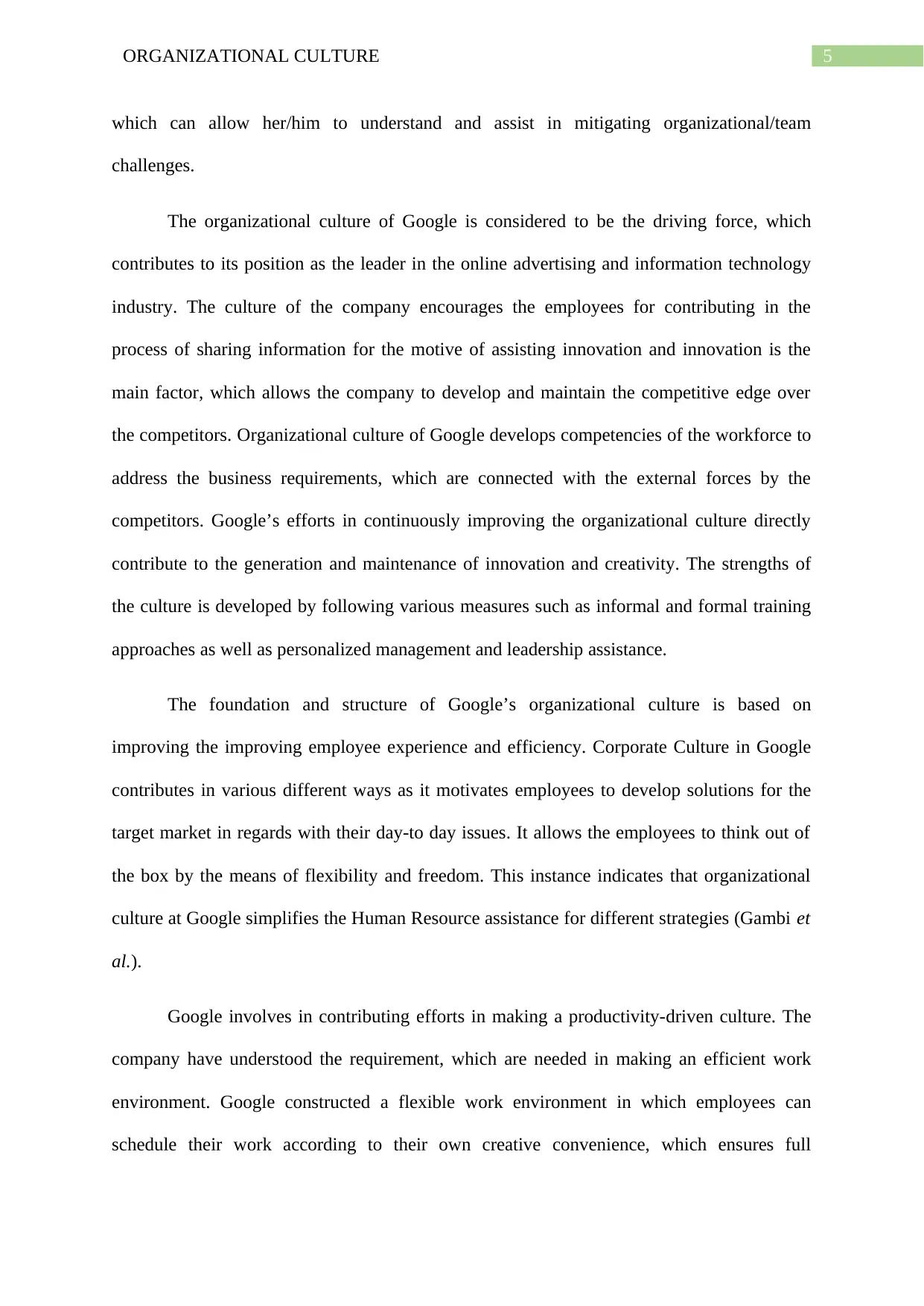
5ORGANIZATIONAL CULTURE
which can allow her/him to understand and assist in mitigating organizational/team
challenges.
The organizational culture of Google is considered to be the driving force, which
contributes to its position as the leader in the online advertising and information technology
industry. The culture of the company encourages the employees for contributing in the
process of sharing information for the motive of assisting innovation and innovation is the
main factor, which allows the company to develop and maintain the competitive edge over
the competitors. Organizational culture of Google develops competencies of the workforce to
address the business requirements, which are connected with the external forces by the
competitors. Google’s efforts in continuously improving the organizational culture directly
contribute to the generation and maintenance of innovation and creativity. The strengths of
the culture is developed by following various measures such as informal and formal training
approaches as well as personalized management and leadership assistance.
The foundation and structure of Google’s organizational culture is based on
improving the improving employee experience and efficiency. Corporate Culture in Google
contributes in various different ways as it motivates employees to develop solutions for the
target market in regards with their day-to day issues. It allows the employees to think out of
the box by the means of flexibility and freedom. This instance indicates that organizational
culture at Google simplifies the Human Resource assistance for different strategies (Gambi et
al.).
Google involves in contributing efforts in making a productivity-driven culture. The
company have understood the requirement, which are needed in making an efficient work
environment. Google constructed a flexible work environment in which employees can
schedule their work according to their own creative convenience, which ensures full
which can allow her/him to understand and assist in mitigating organizational/team
challenges.
The organizational culture of Google is considered to be the driving force, which
contributes to its position as the leader in the online advertising and information technology
industry. The culture of the company encourages the employees for contributing in the
process of sharing information for the motive of assisting innovation and innovation is the
main factor, which allows the company to develop and maintain the competitive edge over
the competitors. Organizational culture of Google develops competencies of the workforce to
address the business requirements, which are connected with the external forces by the
competitors. Google’s efforts in continuously improving the organizational culture directly
contribute to the generation and maintenance of innovation and creativity. The strengths of
the culture is developed by following various measures such as informal and formal training
approaches as well as personalized management and leadership assistance.
The foundation and structure of Google’s organizational culture is based on
improving the improving employee experience and efficiency. Corporate Culture in Google
contributes in various different ways as it motivates employees to develop solutions for the
target market in regards with their day-to day issues. It allows the employees to think out of
the box by the means of flexibility and freedom. This instance indicates that organizational
culture at Google simplifies the Human Resource assistance for different strategies (Gambi et
al.).
Google involves in contributing efforts in making a productivity-driven culture. The
company have understood the requirement, which are needed in making an efficient work
environment. Google constructed a flexible work environment in which employees can
schedule their work according to their own creative convenience, which ensures full
⊘ This is a preview!⊘
Do you want full access?
Subscribe today to unlock all pages.

Trusted by 1+ million students worldwide
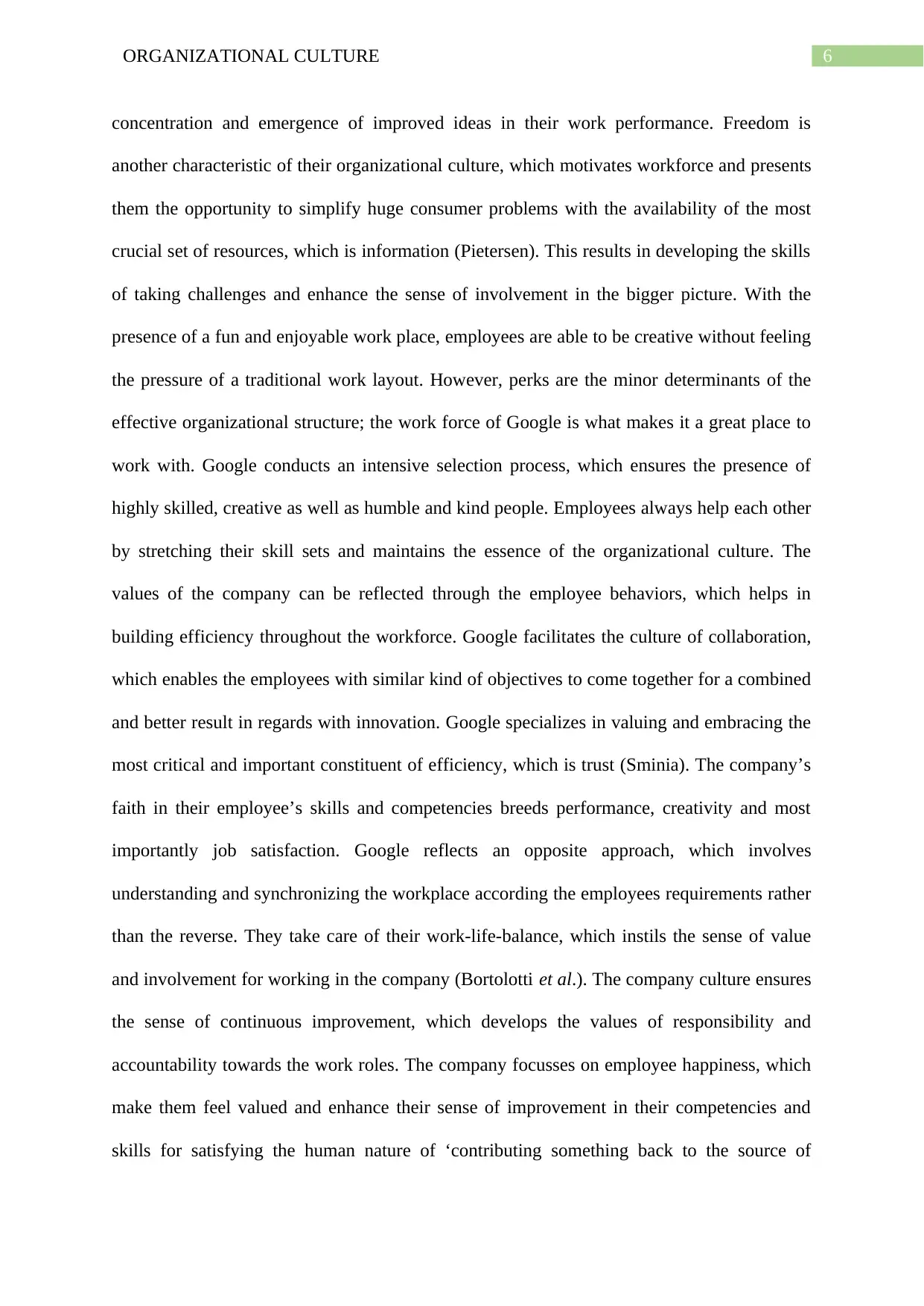
6ORGANIZATIONAL CULTURE
concentration and emergence of improved ideas in their work performance. Freedom is
another characteristic of their organizational culture, which motivates workforce and presents
them the opportunity to simplify huge consumer problems with the availability of the most
crucial set of resources, which is information (Pietersen). This results in developing the skills
of taking challenges and enhance the sense of involvement in the bigger picture. With the
presence of a fun and enjoyable work place, employees are able to be creative without feeling
the pressure of a traditional work layout. However, perks are the minor determinants of the
effective organizational structure; the work force of Google is what makes it a great place to
work with. Google conducts an intensive selection process, which ensures the presence of
highly skilled, creative as well as humble and kind people. Employees always help each other
by stretching their skill sets and maintains the essence of the organizational culture. The
values of the company can be reflected through the employee behaviors, which helps in
building efficiency throughout the workforce. Google facilitates the culture of collaboration,
which enables the employees with similar kind of objectives to come together for a combined
and better result in regards with innovation. Google specializes in valuing and embracing the
most critical and important constituent of efficiency, which is trust (Sminia). The company’s
faith in their employee’s skills and competencies breeds performance, creativity and most
importantly job satisfaction. Google reflects an opposite approach, which involves
understanding and synchronizing the workplace according the employees requirements rather
than the reverse. They take care of their work-life-balance, which instils the sense of value
and involvement for working in the company (Bortolotti et al.). The company culture ensures
the sense of continuous improvement, which develops the values of responsibility and
accountability towards the work roles. The company focusses on employee happiness, which
make them feel valued and enhance their sense of improvement in their competencies and
skills for satisfying the human nature of ‘contributing something back to the source of
concentration and emergence of improved ideas in their work performance. Freedom is
another characteristic of their organizational culture, which motivates workforce and presents
them the opportunity to simplify huge consumer problems with the availability of the most
crucial set of resources, which is information (Pietersen). This results in developing the skills
of taking challenges and enhance the sense of involvement in the bigger picture. With the
presence of a fun and enjoyable work place, employees are able to be creative without feeling
the pressure of a traditional work layout. However, perks are the minor determinants of the
effective organizational structure; the work force of Google is what makes it a great place to
work with. Google conducts an intensive selection process, which ensures the presence of
highly skilled, creative as well as humble and kind people. Employees always help each other
by stretching their skill sets and maintains the essence of the organizational culture. The
values of the company can be reflected through the employee behaviors, which helps in
building efficiency throughout the workforce. Google facilitates the culture of collaboration,
which enables the employees with similar kind of objectives to come together for a combined
and better result in regards with innovation. Google specializes in valuing and embracing the
most critical and important constituent of efficiency, which is trust (Sminia). The company’s
faith in their employee’s skills and competencies breeds performance, creativity and most
importantly job satisfaction. Google reflects an opposite approach, which involves
understanding and synchronizing the workplace according the employees requirements rather
than the reverse. They take care of their work-life-balance, which instils the sense of value
and involvement for working in the company (Bortolotti et al.). The company culture ensures
the sense of continuous improvement, which develops the values of responsibility and
accountability towards the work roles. The company focusses on employee happiness, which
make them feel valued and enhance their sense of improvement in their competencies and
skills for satisfying the human nature of ‘contributing something back to the source of
Paraphrase This Document
Need a fresh take? Get an instant paraphrase of this document with our AI Paraphraser
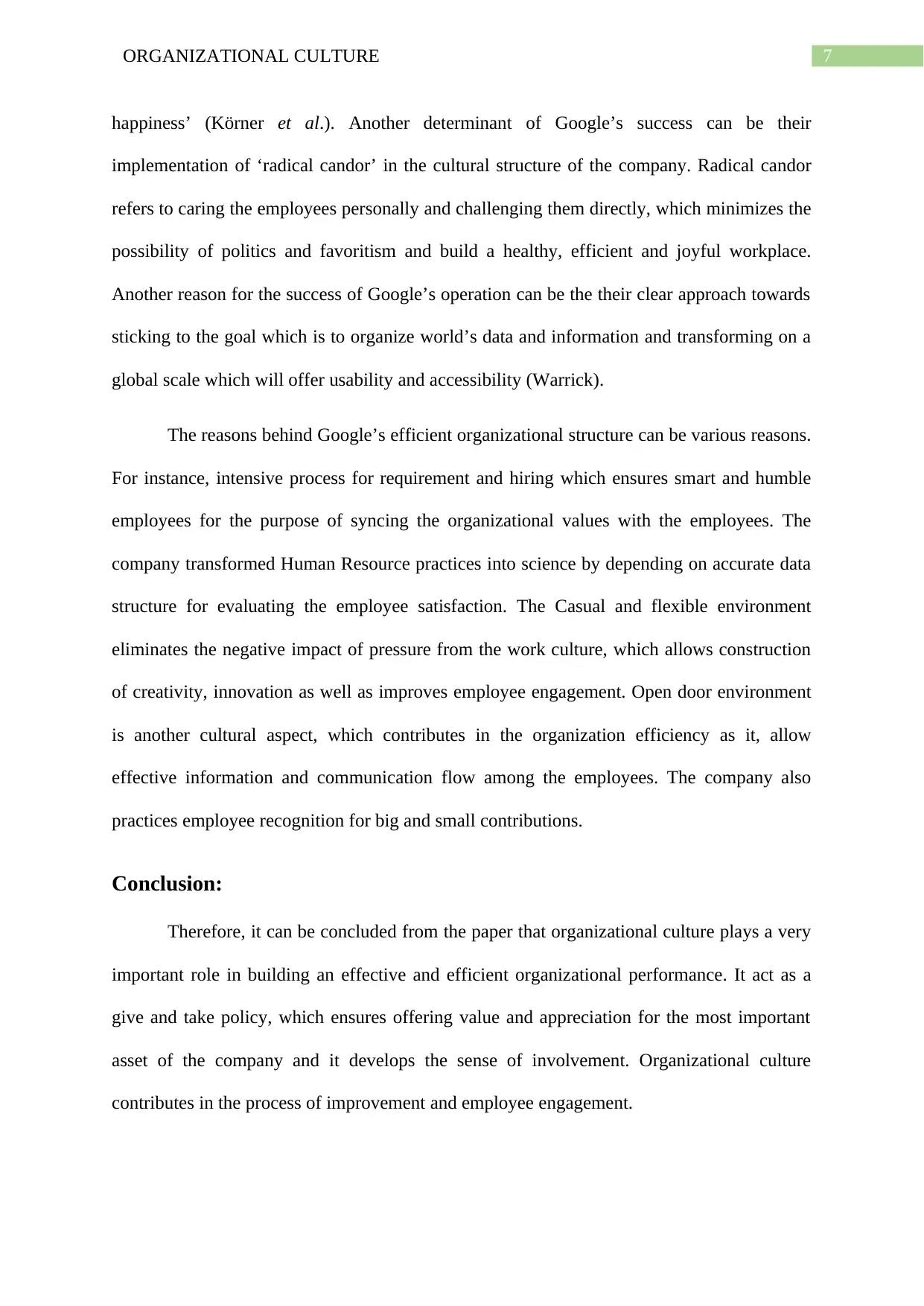
7ORGANIZATIONAL CULTURE
happiness’ (Körner et al.). Another determinant of Google’s success can be their
implementation of ‘radical candor’ in the cultural structure of the company. Radical candor
refers to caring the employees personally and challenging them directly, which minimizes the
possibility of politics and favoritism and build a healthy, efficient and joyful workplace.
Another reason for the success of Google’s operation can be the their clear approach towards
sticking to the goal which is to organize world’s data and information and transforming on a
global scale which will offer usability and accessibility (Warrick).
The reasons behind Google’s efficient organizational structure can be various reasons.
For instance, intensive process for requirement and hiring which ensures smart and humble
employees for the purpose of syncing the organizational values with the employees. The
company transformed Human Resource practices into science by depending on accurate data
structure for evaluating the employee satisfaction. The Casual and flexible environment
eliminates the negative impact of pressure from the work culture, which allows construction
of creativity, innovation as well as improves employee engagement. Open door environment
is another cultural aspect, which contributes in the organization efficiency as it, allow
effective information and communication flow among the employees. The company also
practices employee recognition for big and small contributions.
Conclusion:
Therefore, it can be concluded from the paper that organizational culture plays a very
important role in building an effective and efficient organizational performance. It act as a
give and take policy, which ensures offering value and appreciation for the most important
asset of the company and it develops the sense of involvement. Organizational culture
contributes in the process of improvement and employee engagement.
happiness’ (Körner et al.). Another determinant of Google’s success can be their
implementation of ‘radical candor’ in the cultural structure of the company. Radical candor
refers to caring the employees personally and challenging them directly, which minimizes the
possibility of politics and favoritism and build a healthy, efficient and joyful workplace.
Another reason for the success of Google’s operation can be the their clear approach towards
sticking to the goal which is to organize world’s data and information and transforming on a
global scale which will offer usability and accessibility (Warrick).
The reasons behind Google’s efficient organizational structure can be various reasons.
For instance, intensive process for requirement and hiring which ensures smart and humble
employees for the purpose of syncing the organizational values with the employees. The
company transformed Human Resource practices into science by depending on accurate data
structure for evaluating the employee satisfaction. The Casual and flexible environment
eliminates the negative impact of pressure from the work culture, which allows construction
of creativity, innovation as well as improves employee engagement. Open door environment
is another cultural aspect, which contributes in the organization efficiency as it, allow
effective information and communication flow among the employees. The company also
practices employee recognition for big and small contributions.
Conclusion:
Therefore, it can be concluded from the paper that organizational culture plays a very
important role in building an effective and efficient organizational performance. It act as a
give and take policy, which ensures offering value and appreciation for the most important
asset of the company and it develops the sense of involvement. Organizational culture
contributes in the process of improvement and employee engagement.
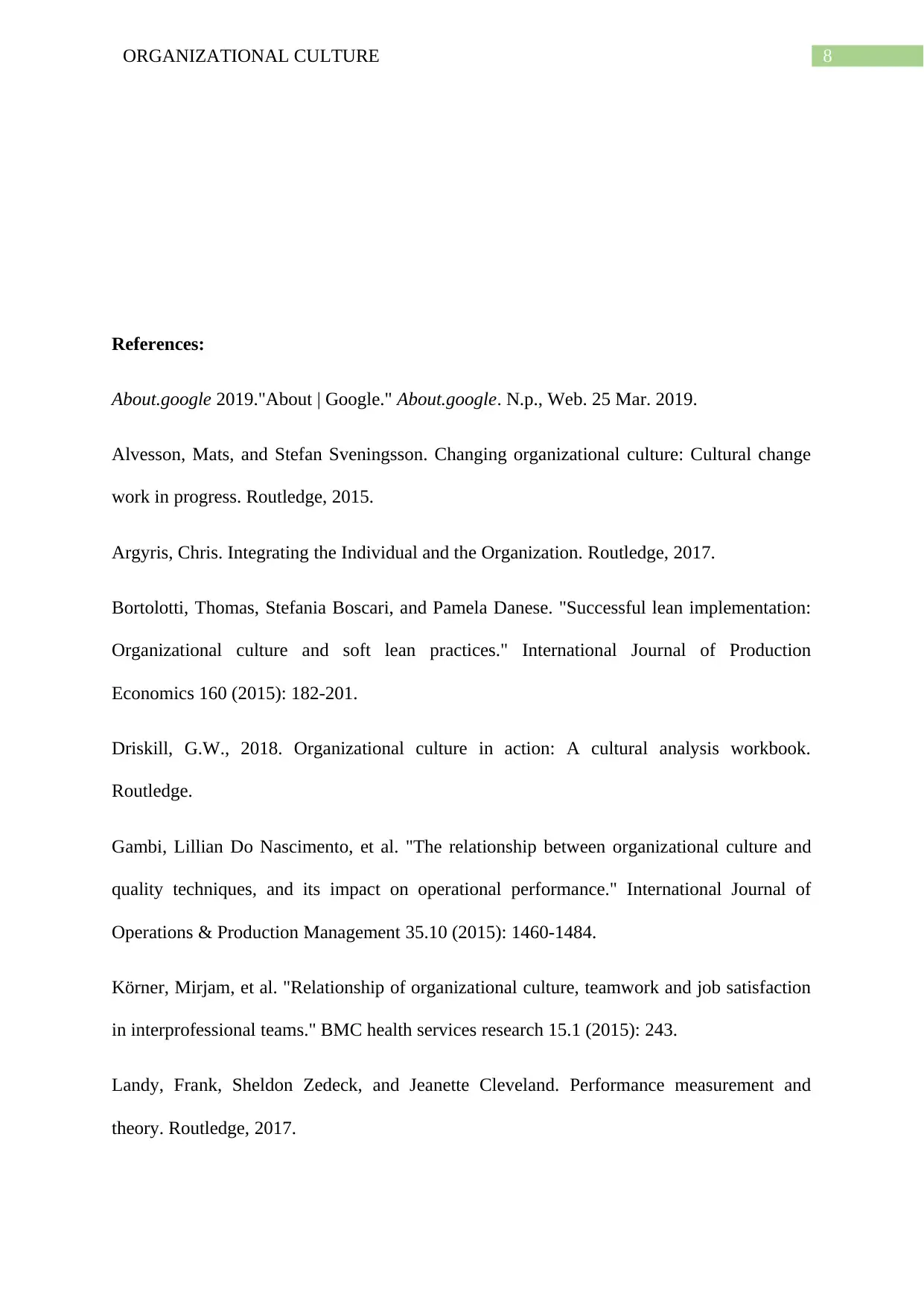
8ORGANIZATIONAL CULTURE
References:
About.google 2019."About | Google." About.google. N.p., Web. 25 Mar. 2019.
Alvesson, Mats, and Stefan Sveningsson. Changing organizational culture: Cultural change
work in progress. Routledge, 2015.
Argyris, Chris. Integrating the Individual and the Organization. Routledge, 2017.
Bortolotti, Thomas, Stefania Boscari, and Pamela Danese. "Successful lean implementation:
Organizational culture and soft lean practices." International Journal of Production
Economics 160 (2015): 182-201.
Driskill, G.W., 2018. Organizational culture in action: A cultural analysis workbook.
Routledge.
Gambi, Lillian Do Nascimento, et al. "The relationship between organizational culture and
quality techniques, and its impact on operational performance." International Journal of
Operations & Production Management 35.10 (2015): 1460-1484.
Körner, Mirjam, et al. "Relationship of organizational culture, teamwork and job satisfaction
in interprofessional teams." BMC health services research 15.1 (2015): 243.
Landy, Frank, Sheldon Zedeck, and Jeanette Cleveland. Performance measurement and
theory. Routledge, 2017.
References:
About.google 2019."About | Google." About.google. N.p., Web. 25 Mar. 2019.
Alvesson, Mats, and Stefan Sveningsson. Changing organizational culture: Cultural change
work in progress. Routledge, 2015.
Argyris, Chris. Integrating the Individual and the Organization. Routledge, 2017.
Bortolotti, Thomas, Stefania Boscari, and Pamela Danese. "Successful lean implementation:
Organizational culture and soft lean practices." International Journal of Production
Economics 160 (2015): 182-201.
Driskill, G.W., 2018. Organizational culture in action: A cultural analysis workbook.
Routledge.
Gambi, Lillian Do Nascimento, et al. "The relationship between organizational culture and
quality techniques, and its impact on operational performance." International Journal of
Operations & Production Management 35.10 (2015): 1460-1484.
Körner, Mirjam, et al. "Relationship of organizational culture, teamwork and job satisfaction
in interprofessional teams." BMC health services research 15.1 (2015): 243.
Landy, Frank, Sheldon Zedeck, and Jeanette Cleveland. Performance measurement and
theory. Routledge, 2017.
⊘ This is a preview!⊘
Do you want full access?
Subscribe today to unlock all pages.

Trusted by 1+ million students worldwide
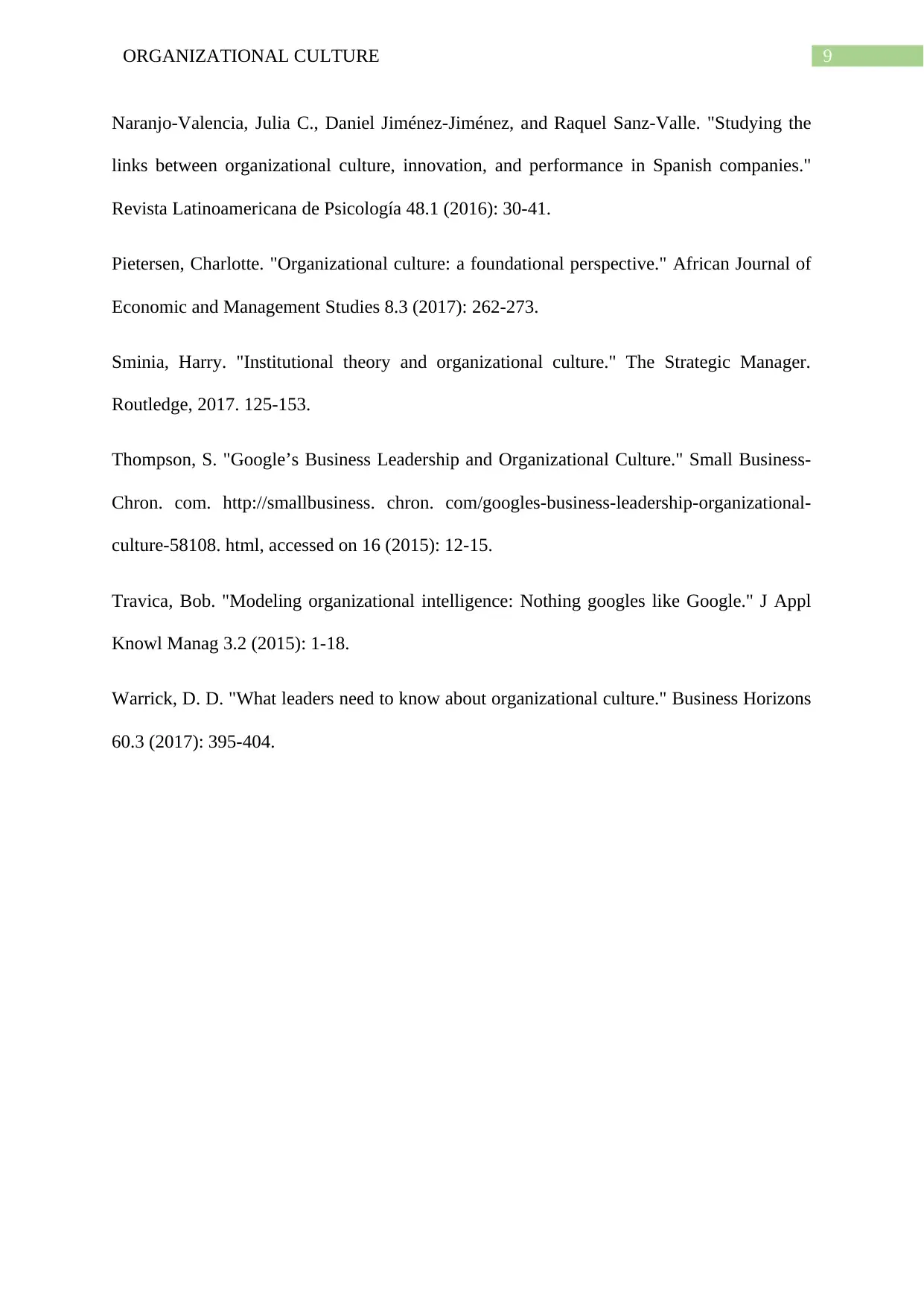
9ORGANIZATIONAL CULTURE
Naranjo-Valencia, Julia C., Daniel Jiménez-Jiménez, and Raquel Sanz-Valle. "Studying the
links between organizational culture, innovation, and performance in Spanish companies."
Revista Latinoamericana de Psicología 48.1 (2016): 30-41.
Pietersen, Charlotte. "Organizational culture: a foundational perspective." African Journal of
Economic and Management Studies 8.3 (2017): 262-273.
Sminia, Harry. "Institutional theory and organizational culture." The Strategic Manager.
Routledge, 2017. 125-153.
Thompson, S. "Google’s Business Leadership and Organizational Culture." Small Business-
Chron. com. http://smallbusiness. chron. com/googles-business-leadership-organizational-
culture-58108. html, accessed on 16 (2015): 12-15.
Travica, Bob. "Modeling organizational intelligence: Nothing googles like Google." J Appl
Knowl Manag 3.2 (2015): 1-18.
Warrick, D. D. "What leaders need to know about organizational culture." Business Horizons
60.3 (2017): 395-404.
Naranjo-Valencia, Julia C., Daniel Jiménez-Jiménez, and Raquel Sanz-Valle. "Studying the
links between organizational culture, innovation, and performance in Spanish companies."
Revista Latinoamericana de Psicología 48.1 (2016): 30-41.
Pietersen, Charlotte. "Organizational culture: a foundational perspective." African Journal of
Economic and Management Studies 8.3 (2017): 262-273.
Sminia, Harry. "Institutional theory and organizational culture." The Strategic Manager.
Routledge, 2017. 125-153.
Thompson, S. "Google’s Business Leadership and Organizational Culture." Small Business-
Chron. com. http://smallbusiness. chron. com/googles-business-leadership-organizational-
culture-58108. html, accessed on 16 (2015): 12-15.
Travica, Bob. "Modeling organizational intelligence: Nothing googles like Google." J Appl
Knowl Manag 3.2 (2015): 1-18.
Warrick, D. D. "What leaders need to know about organizational culture." Business Horizons
60.3 (2017): 395-404.
1 out of 10
Related Documents
Your All-in-One AI-Powered Toolkit for Academic Success.
+13062052269
info@desklib.com
Available 24*7 on WhatsApp / Email
![[object Object]](/_next/static/media/star-bottom.7253800d.svg)
Unlock your academic potential
Copyright © 2020–2026 A2Z Services. All Rights Reserved. Developed and managed by ZUCOL.




